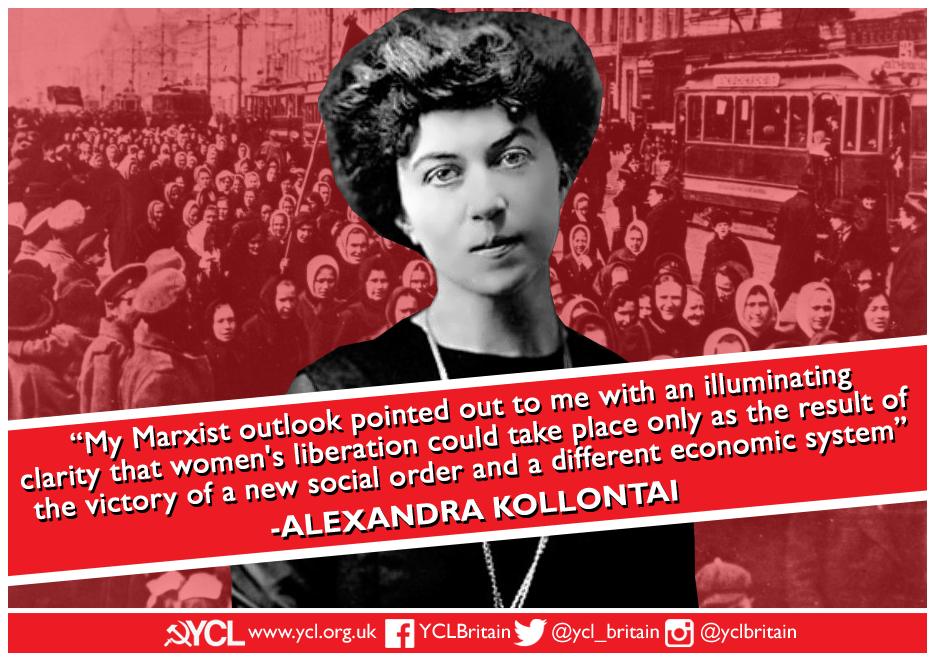 As part of a month long build up to International Women’s Day Celebrations on the 8th of March, the YCL will be publishing daily articles highlighting the exemplary role played by women in the international communist & working class movement.
As part of a month long build up to International Women’s Day Celebrations on the 8th of March, the YCL will be publishing daily articles highlighting the exemplary role played by women in the international communist & working class movement.
Our 11th legend of the international Communist movement is Alexandra Kollontai, Bolshevik, theorist and Soviet diplomat.
YCLers are encouraged to host, support and participate in celebrations locally to bring the message of International Women’s Day into Our workplaces, colleges and schools, and communities.
Alexandra Kollontai (1872-1952) was a revolutionary, an author, a diplomat, an agitator and an organiser whose ideals still hold true today.
Although Kollontai herself was born into the aristocracy, she was raised at time where she was surrounded by people who lived in harsh and unfair conditions. A flame was lit inside her at an early age which yearned to fight against injustice.
As Kollontai entered her 20s, she was to be married at the arrangement of her family, however, she chose instead to marry an impoverished relative in 1893 and together they bore a son. The Kollontais’ marriage was short-lived as she wanted to commit herself to the life of revolutionary.
A pivotal moment for Kollontai was when she visited a textile factory that her husband was set to become the manager of, during this visit she became enraged by the inhumane conditions suffered by women workers there and decided to leave her husband and dedicate her life to the cause of women’s liberation.
Kollontai’s belief that ‘domestic life’ should be abolished was an important one. According to her, marriage was an unnatural constraint on human behaviour and it followed that women must stop being valued as only wives and mothers.
Kollontai declared that: ‘We must build a new society in which women are not expected to drudge all day in kitchens. We must have, in Russia, community restaurants, central kitchens, central laundries — institutions which leave the working woman free to devote her evenings to instructive reading or recreation. Only by breaking the domestic yoke will we give women a chance to live a richer, happier and more complete life.’
She believed that for women to be equal with men, they had to work outside of the home. Thus, women’s emancipation should extend to their sexuality.
Soon after leaving her husband Kollontai began to write extensively and organise strikes. As a Marxist, she believed that women’s liberation was inseparably connected to the liberation of all women and men from capitalism.
She was exiled from Russia by the Tsar in 1908 for her activism. In 1917 when the Tsar fell from power Kollontai returned to Russia and became a prominent Bolshevik campaigner. Lenin appointed her to a key government role in social welfare and in 1920 she was made head of a new department that was devoted to improving the lives of women.
Kollontai was pivotal in the creation of universal maternity care, ensuring women had the same equal access to educational opportunities as men and ensuring that women were treated as equals in the paid labour force. From its inception the Soviet Union sought to liberate women and had one of the most advanced agendas of its time and Kollontai played a vital role in the shaping of Communist policies.
Kollontai remains a key figure for all of those who consider themselves Marxist-feminists and her writings on prostitution, sexual liberation, family and organising inform our world outlook today.
Writing in 1926 she said ‘I always believed that the time inevitably must come when woman will be judged by the same moral standards applied to men. For it is not her specific feminine virtue that gives her a place of honour in human society, but the worth of the useful mission accomplished by her, the worth of her personality as a human being, as citizen, as thinker, as fighter. Subconsciously this motive was the leading force of my whole life and activity. To go my way, to work, to struggle, to create side by side with men and to strive for the attainment of a universal human goal.’
We must build on the ideals which she remained committed to throughout her life and seek to dismantle capitalism in order to fully liberate women.